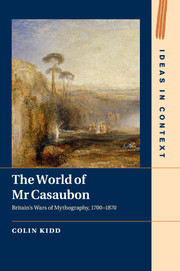Book contents
- Frontmatter
- Contents
- Acknowledgements
- 1 Prologue: Casaubon's Dubious Bequest
- 2 The Key to All Mythologies
- 3 The Legacies of the Ancients in Enlightenment Mythography
- 4 The Obsessions of Jacob Bryant: Arkite Idolatry and the Quest for Troy
- 5 The Dispute of the Orient: Anglo-French Rivalries in an Age of Revolution
- 6 Fish-gods, Floods and Serpent-worship: From Apologetics to Anthropology
- 7 Epilogue: The Keys to All Mythology in 1872
- Index
- Miscellaneous Endmatter
1 - Prologue: Casaubon's Dubious Bequest
Published online by Cambridge University Press: 24 November 2016
- Frontmatter
- Contents
- Acknowledgements
- 1 Prologue: Casaubon's Dubious Bequest
- 2 The Key to All Mythologies
- 3 The Legacies of the Ancients in Enlightenment Mythography
- 4 The Obsessions of Jacob Bryant: Arkite Idolatry and the Quest for Troy
- 5 The Dispute of the Orient: Anglo-French Rivalries in an Age of Revolution
- 6 Fish-gods, Floods and Serpent-worship: From Apologetics to Anthropology
- 7 Epilogue: The Keys to All Mythology in 1872
- Index
- Miscellaneous Endmatter
Summary
My mind is something like the ghost of an ancient, wandering about the world and trying mentally to construct it as it used to be.
(Middlemarch, ch. 2)George E was not quite ‘goddess’ – or was ‘goddess’ with a flaw.
(F. W. Maitland to Henry Jackson, 25 February 1904, in C. H. S. Fifoot [ed.], The Letters of Frederic William Maitland [Selden Society, 1965], p. 296)Unusually, perhaps, this work of history takes as its point of departure a fictional character: Mr Casaubon, the bookish and unworldly clergyman who plays a central role in the plot of George Eliot's novel Middlemarch (1871–2). Postmodern playfulness, however, stops here. What follows is anchored in the realm of eighteenth- and nineteenth-century intellectual life, and tries to describe the contours and content of the once-lively genre of religious apologetics to which the Reverend Edward Casaubon aspired to contribute. The title of Casaubon's unfinished manuscript is ‘The Key to All Mythologies’, which is also used as shorthand here for the field in which Casaubon operates. It is very important to stress at the outset that the primary emphasis of this book does not fall upon the various influences which directly shaped Eliot's portrayal of Casaubon and his activities as a mythographer – or, as often as not, his sluggish and misdirected inactivity. Rather this study anatomises Casaubon's hobby horse. It attempts to recover the discipline and strategies of the ‘science’ of mythography – not only what can be traced to Eliot's known reading or assumed reasonably to be part of her wider general knowledge (dauntingly extensive as these were), but also what lay far beyond. Eliot's sources, inspiration and literary art are, naturally enough, integral to the story, but they do not constitute this book's marrow.
The desire to find an original of Mr Casaubon has turned into one of the more enjoyable, if recherché, snark-hunts in modern literary scholarship. Such was the range of Eliot's reading, and such the fertility of her imagination, that Mr Casaubon lives in fiction as himself, not as a mere cipher for a scholar of whom Eliot had made the acquaintance in real life – that is, as Mary Ann or Marian Evans, for whom ‘George Eliot’ was a pseudonym – or on the page.
- Type
- Chapter
- Information
- The World of Mr CasaubonBritain's Wars of Mythography, 1700–1870, pp. 1 - 28Publisher: Cambridge University PressPrint publication year: 2016

